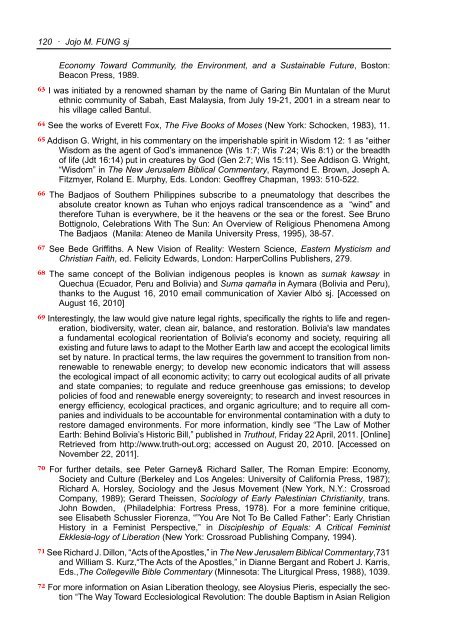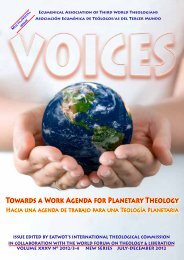voices-2013-2&3 - EATWOT's International Theological Commission
voices-2013-2&3 - EATWOT's International Theological Commission
voices-2013-2&3 - EATWOT's International Theological Commission
You also want an ePaper? Increase the reach of your titles
YUMPU automatically turns print PDFs into web optimized ePapers that Google loves.
120 · Jojo M. FUNG sjEconomy Toward Community, the Environment, and a Sustainable Future, Boston:Beacon Press, 1989.63 I was initiated by a renowned shaman by the name of Garing Bin Muntalan of the Murutethnic community of Sabah, East Malaysia, from July 19-21, 2001 in a stream near tohis village called Bantul.64 See the works of Everett Fox, The Five Books of Moses (New York: Schocken, 1983), 11.65 Addison G. Wright, in his commentary on the imperishable spirit in Wisdom 12: 1 as “eitherWisdom as the agent of God’s immanence (Wis 1:7; Wis 7:24; Wis 8:1) or the breadthof life (Jdt 16:14) put in creatures by God (Gen 2:7; Wis 15:11). See Addison G. Wright,“Wisdom” in The New Jerusalem Biblical Commentary, Raymond E. Brown, Joseph A.Fitzmyer, Roland E. Murphy, Eds. London: Geoffrey Chapman, 1993: 510-522.66 The Badjaos of Southern Philippines subscribe to a pneumatology that describes theabsolute creator known as Tuhan who enjoys radical transcendence as a “wind” andtherefore Tuhan is everywhere, be it the heavens or the sea or the forest. See BrunoBottignolo, Celebrations With The Sun: An Overview of Religious Phenomena AmongThe Badjaos (Manila: Ateneo de Manila University Press, 1995), 38-57.67 See Bede Griffiths. A New Vision of Reality: Western Science, Eastern Mysticism andChristian Faith, ed. Felicity Edwards, London: HarperCollins Publishers, 279.68 The same concept of the Bolivian indigenous peoples is known as sumak kawsay inQuechua (Ecuador, Peru and Bolivia) and Suma qamaña in Aymara (Bolivia and Peru),thanks to the August 16, 2010 email communication of Xavier Albó sj. [Accessed onAugust 16, 2010]69 Interestingly, the law would give nature legal rights, specifically the rights to life and regeneration,biodiversity, water, clean air, balance, and restoration. Bolivia's law mandatesa fundamental ecological reorientation of Bolivia's economy and society, requiring allexisting and future laws to adapt to the Mother Earth law and accept the ecological limitsset by nature. In practical terms, the law requires the government to transition from nonrenewableto renewable energy; to develop new economic indicators that will assessthe ecological impact of all economic activity; to carry out ecological audits of all privateand state companies; to regulate and reduce greenhouse gas emissions; to developpolicies of food and renewable energy sovereignty; to research and invest resources inenergy efficiency, ecological practices, and organic agriculture; and to require all companiesand individuals to be accountable for environmental contamination with a duty torestore damaged environments. For more information, kindly see “The Law of MotherEarth: Behind Bolivia’s Historic Bill,” published in Truthout, Friday 22 April, 2011. [Online]Retrieved from http://www.truth-out.org; accessed on August 20, 2010. [Accessed onNovember 22, 2011].70 For further details, see Peter Garney& Richard Saller, The Roman Empire: Economy,Society and Culture (Berkeley and Los Angeles: University of California Press, 1987);Richard A. Horsley, Sociology and the Jesus Movement (New York, N.Y.: CrossroadCompany, 1989); Gerard Theissen, Sociology of Early Palestinian Christianity, trans.John Bowden, (Philadelphia: Fortress Press, 1978). For a more feminine critique,see Elisabeth Schussler Fiorenza, “”You Are Not To Be Called Father”: Early ChristianHistory in a Feminist Perspective,” in Discipleship of Equals: A Critical FeministEkklesia-logy of Liberation (New York: Crossroad Publishing Company, 1994).71 See Richard J. Dillon, “Acts of the Apostles,” in The New Jerusalem Biblical Commentary,731and William S. Kurz,“The Acts of the Apostles,” in Dianne Bergant and Robert J. Karris,Eds.,The Collegeville Bible Commentary (Minnesota: The Liturgical Press, 1988), 1039.72 For more information on Asian Liberation theology, see Aloysius Pieris, especially the section“The Way Toward Ecclesiological Revolution: The double Baptism in Asian Religion





